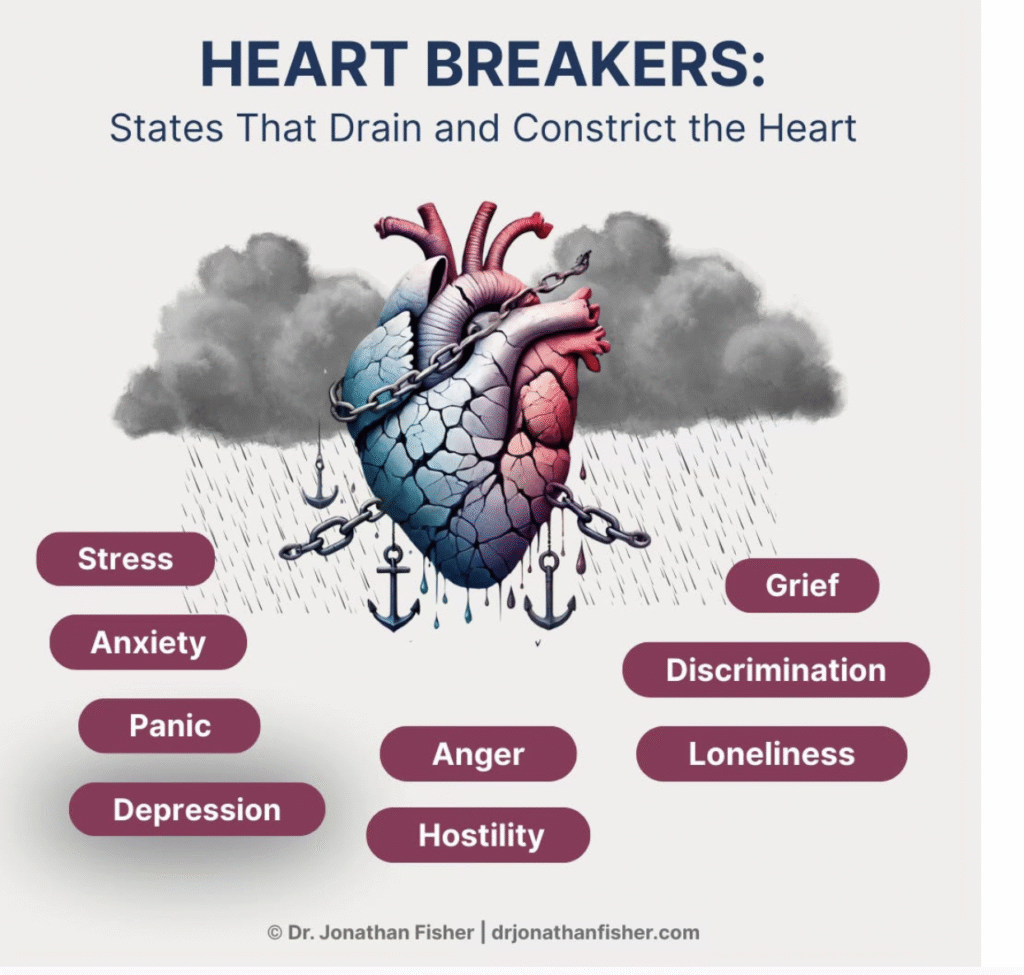Fascinating science from cardiologist Dr. Jonathan Fisher, author of Just One Heart and GWI Breathe Initiative Member: This is an excerpt from his Newsletter:
Depression changes how your heart beats. Not metaphorically—physiologically. When you’re depressed, your heart loses its natural rhythm variations. Instead of speeding up and slowing down flexibly throughout the day—responding to stress, relaxation, connection—it beats more rigidly, mechanically. This change, measured as reduced heart rate variability (HRV), signals that depression has altered your nervous system’s fundamental functioning.
Why does this matter? Because heart rate variability predicts cardiovascular health more accurately than blood pressure or cholesterol.People with depression show 30 percent lower heart rate variability¹. This helps explain why they face increased risk of heart disease, comparable to traditional risk factors like diabetes.
The good news? As depression improves, heart rhythm patterns often restore. Understanding this connection empowers us to protect both emotional and cardiovascular health together.
The Physical Reality of Depression
Depression is a medical condition that affects the entire body, not just mood.
Doctors diagnose depression when several symptoms—sadness, fatigue, sleep disruption, loss of interest, changes in appetite, difficulty concentrating, or feelings of worthlessness—persist for two weeks or more.
But here’s what psychiatrists might not measure: the cardiovascular changes happening simultaneously.
Research shows that depression triggers measurable physical changes². Inflammatory markers like C-reactive protein and interleukin-6 increase 30-40 percent. These same markers contribute to atherosclerosis. Cortisol patterns reverse—staying high at night when they should drop, remaining low in morning when they should rise. Blood becomes more prone to clotting. Arteries lose flexibility.
One in five people experience depression. Women face twice the risk of men. Yet few realize their heart health is also at stake during these episodes.
One in five people experience depression. Women face twice the risk of men. Yet few realize their heart health is also at stake during these episodes.
What I See in My Practice
Dr. James Connors, a 54-year-old surgeon, came for cardiac screening at his wife’s urging. His father had died young of heart disease, and she worried about James’s exhaustion since losing a patient three years earlier. “I sleep poorly,” he told me. “Wake at 3 AM. No energy. Still operating well, but everything feels like effort.” His presentation—fatigue, sleep disruption, emotional withdrawal—reminded me of countless patients where depression and cardiac risk intertwine. The body keeps score in ways we’re only beginning to understand.
How Depression Affects Your Heart
Think of heart rate variability like a fluid jazz performance versus a metronome. A healthy heart improvises constantly—quickening with inspiration, slowing with rest, responding to each moment. Depression shuts down a healthy hearts’ natural ability to improvise.This happens through several pathways:
Your nervous system shifts into a defensive mode. The vagus nerve, which normally helps your heart respond flexibly, becomes underactive. Your sympathetic nervous system—the fight-or-flight response—stays partially activated even at rest. This is why your heart beats more rigidly.
Inflammation increases throughout your body. The same inflammatory chemicals that affect brain function also damage blood vessels. It’s not dramatic—it’s a slow, persistent process that accumulates over years.
Stress hormones remain elevated. Cortisol and adrenaline, meant for brief emergencies, circulate continuously. This affects blood pressure, blood sugar, and vessel health.
Recovery systems shut down. During depression, the body’s natural repair mechanisms—which normally activate during sleep and relaxation—work less effectively. This includes the processes that maintain healthy arteries and optimal heart function.
A 2024 meta-analysis found that exercise alone reduces depression as effectively as antidepressants for many people⁴. But here’s what matters more: these changes are reversible.

